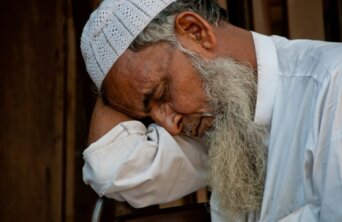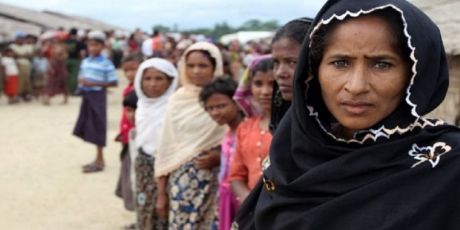- About
- Topics
- Story
- In-Depth
- Picks
- Opinion
- News
- Donate
- Signup for our newsletterOur Editors' Best Picks.Send
Read, Debate: Engage.
| topic: | Discrimination |
|---|---|
| located: | India |
| editor: | Sajad Hameed & Qazi Shibli |
In the alleys of southern New Delhi, a disquieting scene unfolds daily, reflecting the tension gripping the Muslim community. Amidst barricades and the steady march of paramilitary troopers, the once vibrant colonies now echo with apprehension and fear.
This upheaval is due to December 15, 2019, when violent clashes between students and police erupted at Jamia Millia Islamia University. Students rushed inside the library seeking refuge, only for Delhi Police to storm in and unleash a scene of chaos and destruction.
Mustafa, a student caught in the Delhi turmoil, recalls the harrowing experience that marked the beginning of a series of violent clashes. He is using an alias for security reasons.
"It was the most frightening day of my life. I narrowly escaped, but the incident marked the beginning of further police violence, haunting me with nightmares. In the days that followed, violent clashes erupted in Delhi, resulting in numerous casualties," he says.
The root was the Citizenship Amendment Act (CAA) of 2019, which selectively grants Indian citizenship to religious minorities from neighbouring countries, excluding Muslims.
Vanessa Chishti, a political scientist at India's Jindal Global Law School, contextualises the CAA as a legalised form of discrimination, compounded by the National Register of Citizens (NRC), stirring fear among Muslims.
Since the ascent of the Modi-led government in 2014, hate crimes targeting Muslims have surged, reflecting a disturbing trend of vilification and violence.
"What compounds the anxiety within the Muslim community is the portrayal in the media, where Muslims are unfairly accused of various issues, from allegedly waging war against the Hindu majority to being blamed for spreading COVID-19." Says Chishti. "This negative portrayal, coupled with the justification of violence against Muslims, has contributed to increased apprehension among the community."
Protesters against the exclusionary nature of the CAA faced criticism from party officials, branded as "anti-national" or "pro-Pakistan".
Recent statements by Union Home Minister Amit Shah have reignited fears, hinting at the CAA's impending implementation. Statistical data from Hindutva Watch underscores the political undertones, linking anti-Muslim sentiment with states gearing up for elections in 2024.
Chishti says the CAA aligns with Modi's Hindu-nationalist agenda, aiming to marginalise India's Muslim population. The BJP denies these allegations, asserting the law's intent to protect persecuted minorities. Yet, the amalgamation of the CAA with the National Population Register (NPR) amplifies concerns, especially regarding the burden of proving citizenship.
"The normalisation of violence against Muslims has become so ingrained that it doesn't even merit a mention in public discourse anymore," she adds.
"The inadequate training of clerks and officials further complicates the process of proving citizenship," adds Mustafa. He says the complexity of this process is made worse by linguistic diversity and administrative challenges in documentation.
With its diverse population, India faces challenges in providing documentation due to inadequate access to education, healthcare, and birth registration in rural areas. Mustafa also emphasises the diversity of languages spoken across India and the frequent changes in names and spelling variations when transcribed into English.
Meanwhile, over five years, from 2017 to 2022, the government reported the deportation of 14,346 foreigners. Aman Wadud, a legal expert based in Assam, battles several cases related to alleged illegal immigrants and says that more than 150 persons are being held in the six detention camps across the state.
While Wadud says that the process of detaining people unable to prove their citizenship is already underway in detention centres in Assam, Mustafa expresses widespread fear among the people that mass detentions could occur. Many locals are concerned they might be placed in detention centres simply for being Muslim.
Image by Reiner Knudsen.

